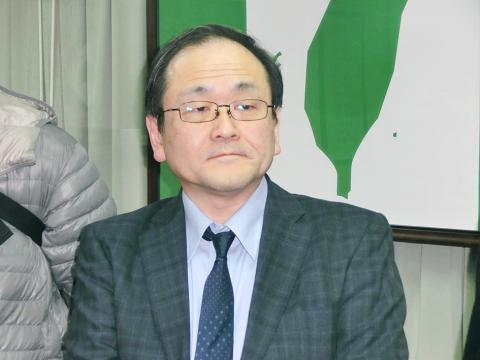Chuo University professor Ryoichi Matsuno has visited Taiwan Nation Alliance convener Yao Chia-wen (姚嘉文) to thank him for his contribution to his students’ research into the 228 Incident, the results of which were published as a special report in the Japanese school’s magazine.
Matsuno said his Japanese college students only knew of Taiwan’s gastronomic delicacies and the aid provided after the March 11 earthquake and tsunami in 2011, but very few were aware of the 228 Incident.
The 228 Incident refers to an uprising that began on Feb. 27, 1947, against the then-Chinese Nationalist Party (KMT) authoritarian regime and the resulting brutal crackdown that left tens of thousands dead and led to nearly four decades of martial law.

Photo: Lee Hsin-fang, Taipei Times
Matsuno said his interest in the Incident and its connection to the university was piqued when he visited the Taipei 228 Memorial Museum in 2012.
“The sight of the cap often worn by Chuo University students in one of the display cases — which was on display for more than six decades — was the start of it all,” he said.
Matsuno said he initially thought that the owner of the cap, Lin Lien-tsung (林連宗), was the only Chuo University student who was killed during the Incident, but further investigation after his return to Japan revealed that 17 other people who had once studied at the university also lost their lives.
Research into why Lin was embroiled in the Incident, the background leading up to the uprising and how it played out was the topic of his students’ thesis on the oral history of the Incident.
The research included interviews with the families of 228 Incident victims, including Lee Jung-chang (李榮昌) and it was recently published as Testimony of a City of Sadness — Taiwan’s 228 Incident and Chuo Graduates.
During his meeting with Yao, Matsuno gave him copies of the thesis for Yao and the 228 Memorial Foundation.
Learning from his conversation with Yao that many victims of the Incident were unable to ask for reparation from the government due to their inability to prove their family members had died in the crackdown, Matsuno said he felt the promotion of the thesis would help spread knowledge of the Incident in Japan.

Chinese spouse and influencer Guan Guan’s (關關) residency permit has been revoked for repeatedly posting pro-China videos that threaten national security, the National Immigration Agency confirmed today. Guan Guan has said many controversial statements in her videos posted to Douyin (抖音), including “the red flag will soon be painted all over Taiwan” and “Taiwan is an inseparable part of China,” and expressing hope for expedited reunification. The agency last year received multiple reports alleging that Guan Guan had advocated for armed reunification. After verifying the reports, the agency last month issued a notice requiring her to appear and explain her actions. Guan

GIVE AND TAKE: Blood demand continues to rise each year, while fewer young donors are available due to the nation’s falling birthrate, a doctor said Blood donors can redeem points earned from donations to obtain limited edition Formosan black bear travel mugs, the Kaohsiung Blood Center said yesterday, as it announced a goal of stocking 20,000 units of blood prior to the Lunar New Year. The last month of the lunar year is National Blood Donation Month, when local centers seek to stockpile blood for use during the Lunar New Year holiday. The blood demand in southern Taiwan — including Tainan and Kaohsiung, as well as Chiayi, Pingtung, Penghu and Taitung counties — is about 2,000 units per day, the center said. The donation campaign aims to boost

The Kaohsiung Tourism Bureau audited six hotels in an effort to prevent price gouging ahead of Korean band BTS’ concert tour in the city scheduled for Nov. 19, 21 and 22 this year. The bureau on Friday said that the audits — conducted in response to allegations of unfair pricing posted on social media — found no wrongdoing. These establishments included the local branches of Chateau de Chine, Hotel Nikko, My Humble House, and Grand Hai Lai, it said, adding that the Consumer Protection Commission would have penalized price gougers had the accusations been substantiated. The bureau said the Tourism Development Act

The Central Weather Administration (CWA) said a magnitude 4.9 earthquake that struck off the coast of eastern Taiwan yesterday was an independent event and part of a stress-adjustment process. The earthquake occurred at 4:47pm, with its epicenter at sea about 45.4km south of Yilan County Hall at a depth of 5.9km, the CWA said. The quake's intensity, which gauges the actual effects of a temblor, was highest in several townships in Yilan and neighboring Hualien County, where it measured 4 on Taiwan's seven-tier intensity scale, the CWA said. Lin Po-yu (林柏佑), a division chief at the CWA's Seismological Center, told a news conference